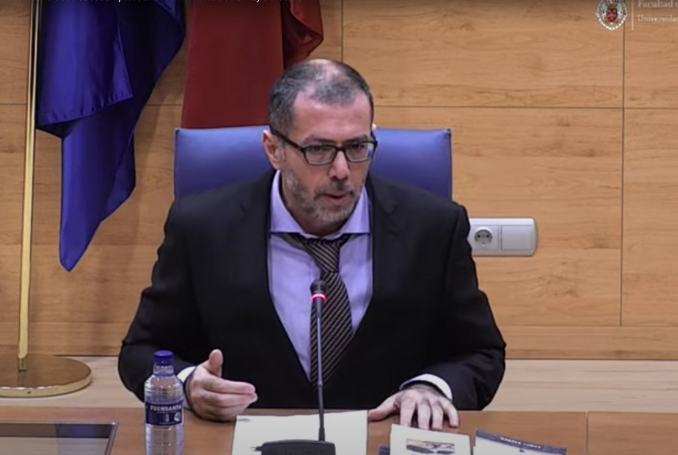Ramzy Baroud Advocates Alternative Narrative on Palestine: Full Lecture at Complutense University in Madrid (WATCH)

Palestine Chronicle Editor Ramzy Baroud delivers a lecture at the Complutense University in Madrid. (Photo: Video Grab)
On the occasion of the Palestinian solidarity week in Madrid, Palestine Chronicle editor and author Ramzy Baroud delivered a lecture at the Universidad Complutense of the Spanish capital, in the department of International Relations.
The lecture was dedicated to offering a different method for exploring, researching, and presenting Palestinian history that challenges the dominant narrative on Palestine and Israel in Western media and academia.
Baroud strongly criticized the common understanding, supported and promoted by the West, that there are two kinds of Palestinians: the “the moderates”, who are worth engaging with, and the “radicals”, who must always be isolated and shunned.
According to this maxim, “Palestinians must always be very careful about what terminology they use,” Baroud said. “This terminology must appeal to (the Western) frame of reference, whether politically, morally or any other. But of course, this is not the truth about Palestine. This is not the reality on the ground. These classifications have no relevance whatsoever.”
“I was born and raised in a refugee camp in Gaza and when I came to the United States I found out that the Palestine described in the media or even in the solidarity groups is entirely different from the Palestine I know,” Baroud added.
“Now that the Oslo Process has completely failed, that the two-state solution (which was never possible, to begin with) is an impossibility, and there is a rising consciousness around the world over challenging old ideas and narratives and the emphasis on intersectionality, there is a need now for the Palestinians to (champion) that third narrative.”
And there is a need to say “that Palestine is neither a terrorist nor a victim, good or bad, moderate or extremist. Palestinians are a people who have been uprooted from their homeland, they have been ethnically cleansed and they have been living in refugee camps (for over 70 years), they are living under siege in Gaza, they are living in an apartheid regime in the West Bank, they are living as second or third-class citizens in Israel itself (historic Palestine), they are denied many of their basic rights, they are fighting for recognition, for rights, for freedom and for a homeland. So, the best way to do that is to go back to the very beginning and tell the story of Palestine from the start.
“The story of Palestine is essentially the story of ordinary people.”
The event was attended by a large number of students and faculties from the Political Science and International Relations departments, along with other schools.
Baroud’s Spain visit also included a talk at Casa Arabe on December 2, as part of the Palestine Week, which was organized to commemorate the International Day of Solidarity with the Palestinian People.
The conference focused on the events that took place in Palestine last May, from the resistance against the forced evictions in Sheikh Jarrah to the Israeli aggression on the besieged Gaza Strip, as seen from the point of view of the Palestinian people.
(The Palestine Chronicle)










































0 Comments